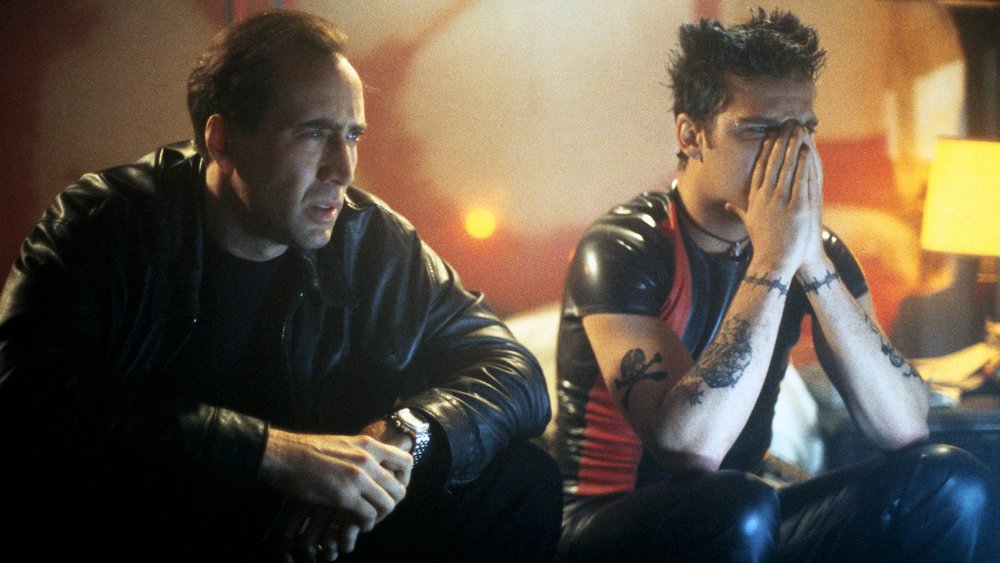
Schlock and Trade
Joel Schumacher’s 8MM turns twenty this year. As someone who didn’t see the film until a couple weeks ago, I’m struggling to evaluate it as anything more than a fascination. Nicolas Cage stars as Tom Welles, a fledgling private investigator hired by a millionaire’s widow to determine the authenticity of an 8MM film found in her dead husband's safe (the movie in question depicts a runaway teen’s murder). This dour neo-noir finds Welles immersed in underworld depravity at the expense of his family, his sanity, and his humanity. For all the allegedly edgy themes in Andrew Kevin Walker’s screenplay (snuff films, bondage, black market porno), there’s little to recommend in an undeniably dated thriller that’s less shocking than a CSI rerun.
I’d imaging that’s true for mainstream audiences, anyway. Pop junkies will get a premium rush from Schumacher’s follow-up to Batman and Robin. What to make, for instance, of Catherine Keener’s thankless turn as the distraught Wife of a Cop on the Edge?* Did she bring anything extraordinary to the role? Or did I just imagine she did, based on performances she’s delivered in the intervening decades?
Impossible to say for sure.
Then there’s the Three Degrees of Face/Off factor: Keener fills Joan Allen’s slot from the ’97 John Woo blockbuster, also starring Cage. Also, 8MM’s antagonist is played by an actor who also appeared as a rival of Cage’s character in that film (even though John Travolta played Cage in those scenes**).
Speaking of unintentional crossovers, is it possible that Schumacher and Walker are big True Romance fans? How else to explain the appearance of James Gandolfini as a murderous scumbag, and the main villain’s assertion that he likes killing people in order to watch their expression change?
The no-fun answer, of course, is “coincidence”.
Then there's 8MM's bizarre ideas about the trajectory of home video. The 8MM film is practically a Maguffin, since no other 8MM films appear in the movie (there is also, given the age of the supposed crime, no reason for the murder to have been captured on such arcane media). The currency of Welles' underworld is VHS tapes. One character makes a passing reference to snuff films making their way onto the Internet, but it's worth noting that disc technology, which dominated the consumer market for nearly two decades in the wake of VHS, doesn't even get a nod. It's as if, on top of everything else, 8MM is secretly an alternate-reality fantasy.
The movie's pièce de résistance, though, is Joaquin Phoenix as Max California, Welles’ scrappy tour guide through the underbelly of illegal entertainment. Again, his performance may only excite pop historians that get a thrill tracking the careers of rare child actors who develop into Oscar-nominated powerhouses. Indeed, I experienced another bout of the Keener Problem during 8MM's climax, assuming that what happens to Max California doesn't really happen to him, based on what I know of characters Joaquin Phoenix became known for playing in later years. When I realized that Walker hadn't planted a climactic twist in his screenplay, and that I'd simply been watching an oddly earnest performance from a young actor who was not long for these kinds of roles--honestly, part of me got giddy.
You don't read much about giddiness in criticism of movies about kidnapping and murder, but that's just another checkmark in 8MM's "Plus" column. I don't know if I would've given a damn about this film in 1999. All I have is my reaction in the modern context, and it's pass-the-popcorn positive.
Thank God for that.
Who wants to rewind the tape on joy?
*You’re right: Welles isn’t a cop, but he fits the archetype.
**Those who’ve never seen Face/Off are right to assume these are the words of a crazy person.

